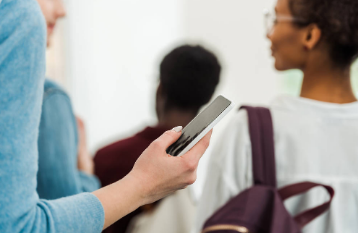The Tech Revolution in School

Jan 17, 2023
Have you ever questioned why suddenly phone usage is being more restricted throughout the district, but many things such as Chromebooks are becoming more prevalent? This is the predicament that has been created between the Administrators of the West Carrollton district versus the teachers and students. Slowly, more and more restrictions are being put in place on tech. Except when it comes to putting the rules in practice it seems to fall apart. That puts the question in place: where does technology fall into place in schools, and what is its long standing spread?
Technology has been helpful throughout the last few years in the terms of education and has been incorporated further into the district with the pandemic forcing teachers to get used to keeping programs such as Google Classroom active and full of class activities. During the pandemic, online classes rose to an all-time high of 58.9% for high school students according to a report made by the US Department of Education. The experience during the pandemic greatly influenced the use of technology by creating a divide that could only be done with the use of programs to externalize school to laptops and phones.
There are negatives to the use of phones and other tech as well, as it is an obvious distraction from schoolwork. Many distractions and bad habits have formed from phones, such as social media overuse via platforms such as Instagram and Snapchat, and many other texting platforms. There is a form of connection where people feel obligated to check their contacts constantly, especially when bored. This creates a distraction on teaching, but it seems almost unavoidable in today’s society. When it comes to technology, there are most likely limits that have to be put in place, however putting a strict ban (although just as an implication) is widely agreed upon by the students as the wrong way of enforcement.
Throughout the years there have been different technology rules that have always been
slowly more strict, however as they slowly add more restrictions nothing happens differently apart from punishing the ones who use their phones further than the previous year. These are enforced within the classroom to hopefully stop the overuse of technology.
However, this is where the teachers intervene, as the enforcers of the classroom they become the mediators of the students on what technology should be used. Many of this technology is accepted within the classroom, helping out further than one person could know. Mr. Hauk, an American History teacher for the High School, has a positive outlook for tech within schools, but sees when it limits his teachings.
“Phones are not obviously going away […] it can be easily distracting, but can be a great tool. It isn’t such a big deal as long as it’s not being used while I am teaching, I am perfectly fine with it otherwise”
It is clear that personally, teachers may not have much of an issue with the new policy, as the new “strict” phone policies don’t seem really enforced unless directed by a teacher. Many students have noted that the new policy is dependent on phone use during the classroom, which many students see as fair, compared to no phones at all which is something that is generally disliked by students. Technology is generally being accepted by more and more teachers, especially since the pandemic most publish materials online. Placing restrictions on technology may be inevitable, but it doesn’t have to restrict everything involved in the classroom.
The future of schooling is going in a direction that is being more influenced by technology. With more programs and progress being made for the convenience of learning for future generations. Intel has stated their enthusiasm for the future of technology in schools, wanting to incorporate experimental technology such as “Augmented” systems to enhance the existing teaching formula. There are many new innovative technologies also being created. It is always interesting to see how technology will create new standards, and those standards may not exist until its commonplace.
Generally speaking, technology is an innovative platform, and is worthwhile to introduce more into schools, however, those boundaries set by rules cannot make everyone happy. With any new tool comes brand new issues, and those must be resolved in the future. Perhaps in the short-term, there may be new ways to incorporate programs that students like using phones in new ways.
